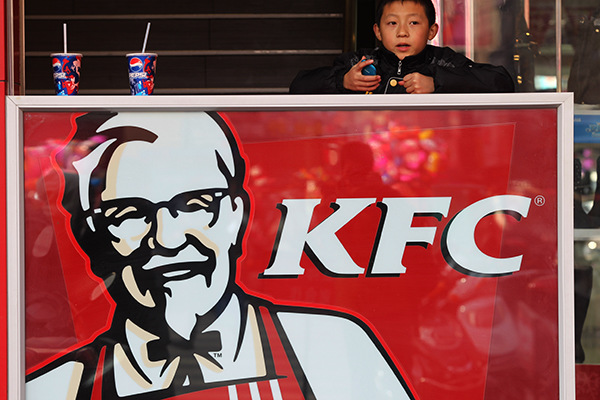
A boy plays at a KFC restaurant in Nantong, Jiangsu province. Yum Brands Inc, owner of KFC and Pizza Hut chains, gets more than half of its revenue from China. (Photo/China Daily)
U.S. and Philippine businesses and products, from the American fast food chain KFC and Apple's iPhones to dried mangoes from the Philippines, have become the targets of online calls for mass boycott in the week following the ruling of the arbitral tribunal in the case initiated by Manila against Beijing over the South China Sea dispute.
The boycott call reportedly prompted a number of youths to assemble in front of a KFC outlet in Laoting county, Hebei province, on Sunday where they tried to dissuade people from entering the restaurant. The video of this event has hit the internet but its authenticity is yet to be proved. There is no denying, however, that the online call to boycott Philippine and U.S. goods is related to the arbitration case because those two countries were behind the move on the South China Sea issue.
The boycott call is reminiscent of the mass protests in 2012, when China-Japan relations soured because of their dispute over Diaoyu Islands in the East China Sea. During the protests, Li Jianli, the driver of a Toyota car in Xi'an, Shaanxi province, was hit by a young protestor in the head and was paralyzed in the right side of his body.
Although no violence was involved in the KFC incident, the rising clamor for boycotting products from the U.S., the Philippines, Japan and the Republic of Korea (for its decision to deploy the U.S.' Terminal High-Altitude Area Defense system, which poses a threat to China's national security) is worrisome. And if this goes unchecked, there could be unexpected outcomes that, like the protests in 2012, cause serious social and personal damage.
It is understandable that some people want to vent their anger by boycotting Philippine and U.S. businesses and products, but they should not violate the law or disrupt the normal operation of businesses, Chinese and foreign both.
Not buying products or availing of the services of U.S., Japan or Philippine companies is a personal choice. And although it may seem unreasonable, people have the freedom to choose what to do so long as their activities do not damage the interests of others.
Unfortunately, what happened in the past, especially the brutal attack on the Toyota driver in Xi'an and smashing of cars made by Japanese companies in some Chinese cities four years ago, shows that things often go out of control if not properly managed from the start.
In the KFC boycott case, the normal operation of the restaurant must have been disrupted. In such cases, police are obliged to step in to restore order.
After China launched its reform and opening-up more than three decades ago, large numbers of foreign enterprises invested in the country and thus helped boost its economic growth and create jobs for the local people. China today is the world's second-largest economy and foreign-funded enterprises played a vital role in its miraculous economic achievement.
No doubt, foreign-funded companies should not be exempt from punishment if they violate Chinese laws and regulations. For instance, British drug-maker GlaxoSmithKline China was fined about $500 million in 2014 for bribing hospital personnel, and medical institutions and organizations to inflate drug prices.
But the normal operation of law-abiding foreign companies should be protected. It is part of the serious commitment China has made to the world, without which few enterprises from abroad would like to continue to invest in the country.
Moreover, it is well known that many of the foreign-funded enterprises in China, such as KFC, have been localized and mostly employ local people and purchase raw materials from China. So by boycotting them we would compromise the livelihoods of many Chinese.
The author Xin Zhiming is a senior writer with China Daily.


















































